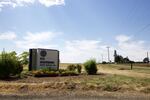
Mike Murray, Katie Ryan, Preston Hill, Jack Stevens and Michael Ryan at the Bridge Street Coffee House in Sheridan, Ore.
Ericka Cruz Guevarra / OPB
About two miles up the hill from Sheridan's lone coffee shop, 123 immigrant detainees are being held inside the nearby Federal Correctional Institution.
Michael Ryan, 70, sips his coffee and wonders why.
"And why do these people get automatically tagged as enemies of the country?" said Ryan, who's sitting in the Bridge Street Coffee House with a group of regulars. "I don't understand it."
Sheridan is a small, rural town in Yamhill County. In 2016, President Donald Trump won the county with about 48 percent of the vote.
The town is so small that the prison's total inmate population accounts for about 29 percent of the city's population.
Now, with 123 immigrant detainees in town drawing protestors, lawmakers and media attention, the Trump Administration's immigration policies are driving the small town to deal with a sudden burst into the spotlight, all while they raise questions of their own about who's being held in detention in their community and what's happening to them.

Amber Deibel and Frank Sheridan are regulars at the Bridge Street Coffee House in Sheridan.
Ericka Cruz Guevarra / OPB
In April, the U.S. Department of Justice announced a zero tolerance immigration policy, calling for anyone entering the United States unlawfully to be criminally prosecuted. Some of the detainees have ended up in Oregon.
Frank Sheridan, the town's city manager, has taken note of visits from members of Oregon's congressional delegation who he says rarely swing by this part of Oregon. Sheridan says having immigrant detainees in town isn't really what he wants Sheridan to be known for – but now, it is.
"If there weren't detainees there, there probably wouldn't be anyone interested in coming down here," he said.
Locals watch as media drop in as quickly as they pack up to leave. Jack Stevens, who lives in next door Polk County and visits the coffee shop in Sheridan often, said he didn't even know immigrants were being detained in Sheridan until he drove through one of the main entrances into town and noticed an unusual amount of traffic caused by a protest.
"What's the end game?" Stevens said, referring to the Trump Administration's immigration policy. "I don't know what they're doing ... And who's going to tell you?"
Immigration attorneys and faith leaders trying to provide services to the detainees say they've been turned away. With only some exceptions, access to the detainees at the Sheridan prison has been extremely difficult.
Amber Deibel, who's lived in Sheridan for 30 years, said most of the protestors drawing attention to Sheridan are from out of town. She said she doesn't like the criticism she hears directed toward the people who work at the correctional facility – people like her son.

The Federal Correctional Institutional in Sheridan, Oregon.
Ericka Cruz Guevarra / OPB
"They have no control over who the government sends up there or anything," Deibel said. "When you go to work you have to do what your bosses are telling you, and they want to do the best they can, I'm sure."
Residents like Ryan are also feeling left in the dark about who exactly is being detained in town and what's happening to them.
"You might be a business person coming into this country to do legitimate business, and you end up over here?" he said. "That's not fair, that's not right. I feel like if they can do that to them, they'll do it to us when we go to their country."
Jerry James has questions, too. But he doesn't quite know who to direct them to.
"I care, but what can I do about it, you know what I mean?" James said. "If I was President Trump I could do something. If I'm Jerry James, no ... I wouldn't know where to begin."